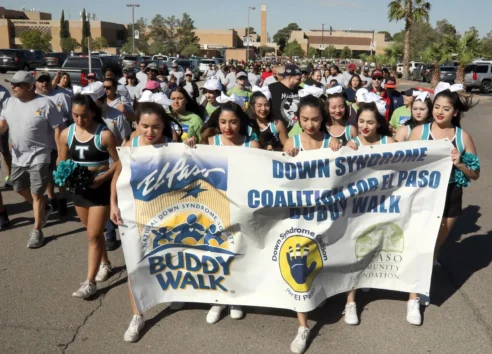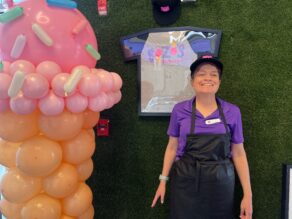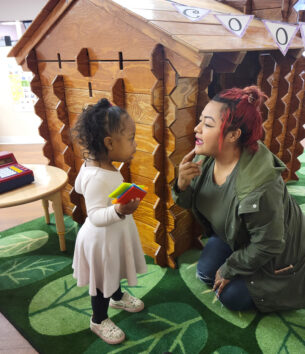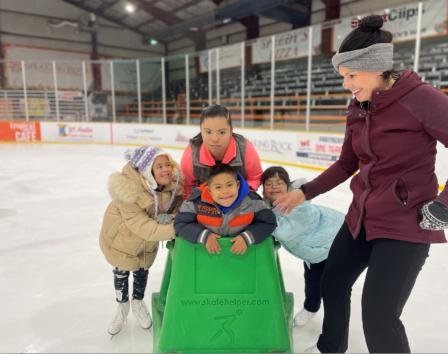Exclusive Interview with the Down Syndrome Coalition for El Paso President – Amelia Rau
The Down Syndrome Coalition for El Paso (DSCEP), established in 2015 in partnership with the El Paso Community Foundation, focuses on outreach and fundraising events for individuals with Down syndrome. Recent initiatives include launching an inclusive preschool, creating employment opportunities for individuals with intellectual and developmental disabilities (IDD) through Gozos Ice Cream Shop, and addressing food insecurity with job training programs while promoting community inclusivity in local renovations and events.
GLOBAL Vice President – Strategic Alliances, David Tolleson, met with Amelia M. Rau, Ph.D., CCC-SLP, President of the Down Syndrome Coalition for El Paso to discuss her experiences as a Speech Language Pathologist (SLP) in a multicultural community, the organizations recent initiatives, and more.

DAVID: How did you get involved with the Down syndrome community and DSCEP?
AMELIA: I started in high school, doing in-home therapy and Applied Behavior Analysis, assisting families with children with autism. Then, I went into the field of Speech Language Pathology and have been a Speech Language Pathologist (SLP) for 15 years. I was always interested in world languages and linguistics and how the brain might learn and develop in the presence of two languages. So, I’m very interested in bilingualism in persons who have different abilities. That’s how I ended up on the border. During some of my clinical work, when I was serving families of children with Down syndrome, I found myself volunteering as a figure skating coach for those with different abilities and wanting to start dance programs or worrying about expanding the arts to include persons with different abilities and from all walks of life, especially after high school. That’s where I was connecting with families that needed some of my skill sets in terms of bridging the research and translational parts and how to interact with different systems and the government and legislation. So, I’m a provider, an ally, and an advocate.
DAVID: Is El Paso home for you?
AMELIA: I’m actually from the Midwest but have been living in El Paso about 13 years. My career led me to the border. I started out working at New Mexico State University, then just 30 miles down the road an opportunity opened for me at the University of Texas – El Paso (UTEP). I love El Paso. It’s a lot like Montreal in that you have two languages and cultures equally balanced.

DAVID: The Midwest doesn’t seem like it would be a hot bed of bilingualism.
AMELIA: No, but I was raised academically in the Big 10 (University of Iowa, Arizona State, University of Minnesota), where there was a big push for what’s innovative and cutting edge. It was a real clear area for exploration academically. So, that’s what led me to Hispanic-serving institutes and UTEP is amazing! I’m in a community where 80% of our population uses 2 or more languages on a daily basis. My favorite type of bilingual is someone with complex communication needs. The research that I do is with people who have limited verbal skills or are non-verbal bilinguals. Interestingly, bilingualism doesn’t increase the risk for communication difficulties in someone where Down syndrome is the primary diagnosis and the language impairment is secondary to that. We don’t expect having Down syndrome to increase the level of difficulty of learning multiple languages. You can have a complex communication need and have a core vocabulary of less than 50 words, you can use a communication device, you can use visual supports, you can use key word signing, and you can be bilingual.
DAVID: Most folks know how an SLP can help children, but how can an SLP help someone who is grown and out of the school setting?
AMELIA: We can always keep growing and improving. You and I are still refining our ability to tell stories, negotiate, and tell jokes. Even though the greatest spurt of development is in the early years gains can be made into adulthood, especially with co-constructed goal setting about what is meaningful. So, if someone needs to rehearse and refine language or communication interaction for success in the workplace, a speech pathologist can help train up the needed language to do so. Or, it can be about making friends, the pragmatic part of life, about advocating during patient-provider interactions, and being able to express their own levels of pain. Or, as adults, we start to gain baggage and grief and sometimes we need some talk-based therapy, and I think the speech pathologist is instrumental in all of those communicative interactions as adults.
During COVID, quite often persons with Down syndrome were in the hospital and struggling with needing some type of ventilation or oxygen support and, in that case, a speech pathologist is an expert in feeding and swallowing disorders and can help coordinate the breathing with safe swallowing.
DAVID: Share a bit about DSCEP’s work.
AMELIA: We were established in 2015 and we work as a partnership project with the El Paso Community Foundation. Annually we have a calendar of key outreach and fundraising events. We host a Buddy Walk. We celebrate World Down Syndrome Day. We have lots of seasonal celebrations and dance parties. Parent outreach has definitely shifted since the pandemic. We used to run a summer symposium with about 300 attendees, but post-pandemic it was harder to get people to participate in person, so have focused on maximizing events that are already happening and trying to insert Down syndrome-specific topics. We’ve also focused on smaller mini-series, like evening programs or lunch-n-learns. Every year we send folks on scholarship to the NDSC Convention. We recently launched a Next Chapter book club for self-advocates over age 18. We’re working with a really cool group called Beautiful Minds MALI who work on STEAM (science, technology, engineering, arts, math) camps with a dedicated inclusive commitment.

In 2017, we established an inclusive pre-school. As an organization, we often launch things, but don’t hold onto them forever. Just this last year, we let Every Little Blessing Preschool fly free, so now it’s established as its own 501(c)(3). We’re still a partner and still collaborate, but that freed up our Board to work on other projects. We were part of getting the franchise agreement for Howdy Homemade and subsequently rebranding that as Gozos Ice Cream Shop to put in our Children’s Museum (“Gozos” means “joy” in Spanish). We’re hoping to have 3 locations with 50 employees with IDD – and growing! That’s creating employment opportunities, but also the model can teach other business owners about how reliable, efficient, and trustworthy employees with IDD are.

Another opportunity we just got some funding for is Project Feeds. A hot topic is the current unmet needs related to food insecurity. Using the Gozos model, how can you insert job training and meaningful employment and activity? If you can get sponsors to provide the supplies for free, can you have pop-up giveaways where people with IDD provide customer service? We’re working now to see how we can partner with food banks and hunger organizations to decrease the stigma of going to the food pantries and increase the job training and employment opportunities for individuals that have IDD.
Our museum system has been really open-minded, asking our board members to consult on making things more inclusive, more sensory friendly, more friendly for simplified language and accessibility for those with visual impairments or who use wheelchairs. Our downtown area is undergoing a lot of renovation and because of our community foundation, we’ve been well-included in discussions about playgrounds, museums, festivals and fairs, for people of all abilities. We work to make sure that everyone, including security personnel, are well-trained on how to be respectful and inclusive and create safe havens and trusting relationships where families want to go and know there’s no shame attached to being different or having different needs.
We have 2 more upcoming projects. We’re working to get a fleet of Strider bikes and thinking about sustainable models by pairing that with our Parks and Rec department, so that the bikes “live” somewhere and are on a cyclic training program. We’re also working closely with our local universities and community colleges looking for intentional programs of study and enrichment study that give the community college or college experience for adults with IDD.
DAVID: Are there opportunities and challenges that are unique to your community?
AMELIA: We have some issues related to health disparities that are higher than elsewhere in terms of access, insurance, and having a wide range of specialists in the area. El Paso is working hard to make sure that infrastructure exists, clinics are available, specialists and time to referral and moving through are available, providers that match you on the language, access without insurance for uninsured or underinsured individuals, so a lot of health fair and community clinic work is happening. Even so, there are gaps to finding someone who is attuned to the unique needs of someone with Down syndrome. So, there are the general risks of poorer outcomes for our community as a whole, but then there’s an extra layer of those who need specialized attention and not enough providers who are trained to handle them that adds another barrier to having quality health outcomes and positive interactions with providers.

DAVID: Nonprofits have to be very mindful about how to spend their donors’ hard-earned money. Why is it important to you and your board to support GLOBAL’s research and medical work, including the Adult Guidelines?
AMELIA: In El Paso in general, people live long, but not necessarily with high quality indicators through that lifespan and people with Down syndrome are living longer, but again, not necessarily with the highest level of health quality outcomes. So, I think your research is really important. Not only do we want longevity of life, we want good life until the end. We believe in, and are committed to, your work, because it’s transformative. If we can improve the general population outcomes for all – including persons with Down syndrome and their unique needs – that is something we’re onboard with and want to amplify and promote and contribute to as best we can. Everyone deserves a good, healthy long life.
DAVID: Yes, they do! We agree with you 100%!
DAVID: GLOBAL is providing more resources in Spanish, including our new webinar series and our Medical Care Guidelines for Adults. How will this be helpful in El Paso?
AMELIA: For me, there is a bilingualism that is basic interpersonal communication skills that we all use for heart-to-heart, mealtime, family interactions. But there is also the need for vocational Spanish. Giving medical interpreters or the providers themselves appropriate language is important. In El Paso, we have a lot of Colombian, Cuban and Venezuelan doctors who operate with this level of eloquence. Our community deserves that high-tiered level and respect in their language as well. We translate as providers and that’s important, but I think for credibility and operating with the highest level of competence as providers we need our materials not to be textbooks in English with quick translations. We need the original materials with high level vocabulary and nuances in that language because it helps us think about things in that language as we think about sharing that information with our clientele. As a bilingual practitioner, when I’m working and learning about dysarthria I’m pretty good at in English, but in the moment I need to explain it bedside in Spanish my brain isn’t so primed and our providers need that. When we’re talking about complex medical needs, our providers need that standard and that’s going to trickle down and elevate the ability of clients and patients to self-advocate if they can see the parent-friendly version and elevated professional version of the GLOBAL Adult Guidelines in their own language.

DAVID: Is there anything else that we haven’t covered that you’d like to share?
AMELIA: There are lots of entities in El Paso that are contributing. Small groups, big groups, different alliances that we’re trying to form. We’re a big and growing city of nearly 700,000 people, with nearly a million in the metro area. I hope there’s a strong message that the DSCEP is one of those organizations, but we can’t do it alone, so please give a good strong nod to all our alliances and partners in the area. Of course, most of all, we can’t do it without our families and the individuals we serve. Nothing for community without community!
Recent Posts
- Exclusive Interview with Down Syndrome Alabama Executive Director – Missy Haughery
- Join Headliners Phillip Phillips & Tucker Emry at GLOBAL’S AcceptAbility Gala in DC!
- Clarissa Capuano & Midori Francis: Positivity & Authenticity
- Exclusive Interview with the Down Syndrome Coalition for El Paso President – Amelia Rau
- In Loving Memory of Quincy Jones

 Experience our inspirational and groundbreaking videos and photos. Our children and self-advocates are beautiful AND brilliant!
Experience our inspirational and groundbreaking videos and photos. Our children and self-advocates are beautiful AND brilliant! Make sure your local Representatives are on the Congressional Down Syndrome Task Force.
Make sure your local Representatives are on the Congressional Down Syndrome Task Force.